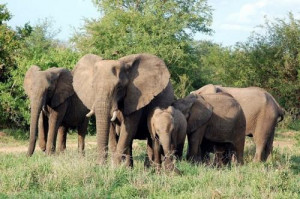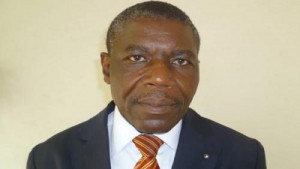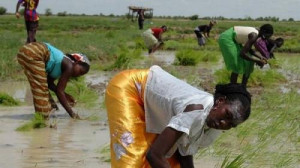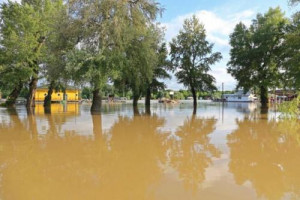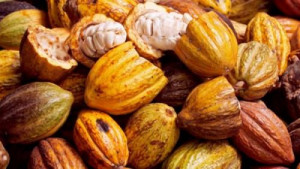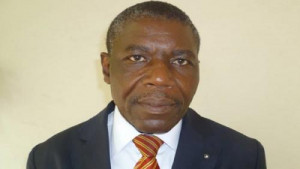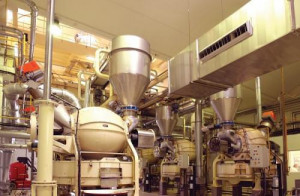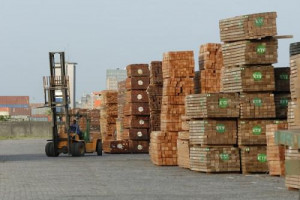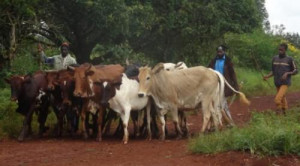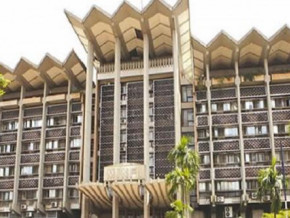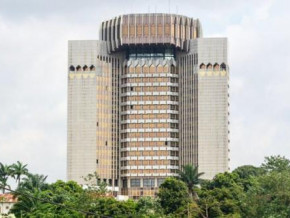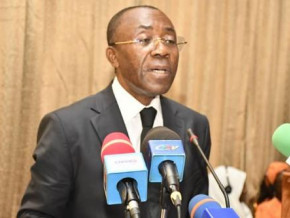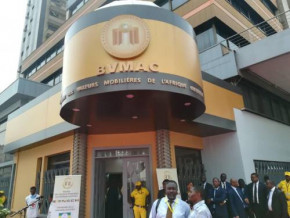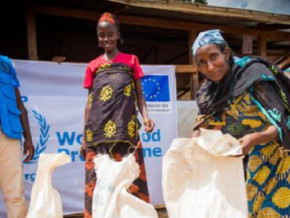
More than 100 wandering elephants destroy fields and crops in the Far-north
A group of more than 100 wandering elephants is currently wreaking havoc in the villages of Kaola, Daïba Tiyou and the districts of Yagoua and Wina in Cameroon's Far North region, L'œil du Sahel revealed.
These animals that left the Kalfou forest reserve in search of water, we learn, destroyed cereal fields and crops generally stored in granaries outside huts. Such phenomenon is recurrent in the Far North region, where conflicts between this protected species and humans are permanent.
This worsens the already precarious food situation in this part of the country, due to the advancing desert which has been accelerated in recent years by climate change.
BRM
Cameroon: Government to rehabilitate Semry’s production facility
Cameroonian minister of agriculture and rural development announced the upcoming rehabilitation of equipment at the rice development company Semry. Announcement was made May 4, 2019, during the launch of the 2019 agricultural season in the northern regions of Cameroon.
“We are going to rehabilitate Semry's production facilities by restoring a hulling line, repairing ploughing equipment and acquiring new ones,” Gabriel Mbairobe said.
This government measure, let’s note, is to breathe new life into this company which has been facing financial pressures recently. Indeed, due to the lack of adequate equipment, the production of paddy rice is often shipped to Nigeria for hulling.
BRM
Semry produced 8,000 tons more rice than expected in 2018, despite financial strains
Cameroon’s rice development firm in the northern region (Semry) ended 2018 with a paddy rice production of 80,000 tons, up 8,000 tons from the 72,000 tons forecasted earlier in the year. Figures were disclosed May 4 in Ngaoundere during the official launching ceremony of the 2019 agriculture campaign in the northern regions.
Company managers said this increase is welcome, in a difficult context marked by financial pressures. Indeed, Semry owes employees between five and six months’ salary arrears; a situation due to delay in government subsidy granted to the company.
BRM
Central Africa commits to develop a hydro-meteorological services network to anticipate natural disasters
The Economic Community of Central African States (ECCAS) gathered on May 3 in Libreville, Gabon, with all 11 sub-region countries for a forum on hydrometeorology. The project is backed by the World Bank.
According to the World Bank, the forum aims to enable all States to protect their populations and preserve their natural resources by setting up a common platform for the prevention of environmental risks and natural disaster.
“By upgrading our hydro meteorological services, our countries will be able to have essential information on meteorological, hydrological and weather conditions in order to predict natural disasters,” said Cameroonian Marie-Chantal Mfoula, Deputy Secretary General in charge of the Physical, Economic and Monetary Integration Department at ECCAS, during the meeting.
Once the project is completed, the World Bank explains, local communities will be able to access weather forecasts and tools in real time, including alerts on the radio or on their mobile phones. But first, countries must, among other things, accelerate the establishment of the Central African Climate Prediction and Application Centre (Capc-AC) and mobilize resources needed for its operation.
S.A
Cameroon: Cocoa farm gate price grew to XAF1,200 from XAF1,100
Cocoa farm gate price in Cameroon’s production zones reached a maximum of XAF1,200 today May 3, 2018 while it was XAF1,100 a month earlier, according to data compiled by the sectors’ information system.
As regard the average minimum price offered to producers, it is XAF1,060 compared to XAF1050 a month earlier.
New prices are the best in at least two campaigns since they approach the peak of XAF1,500 per kilogram reached a few years ago. Improvement can be explained by the increase in demand for beans, following the recent commissioning of a new processing unit (32,000 tons).
Pressure on demand for beans is also due to the difficulties of collecting cargoes in the south-western region of Cameroon, the country's main cocoa production basin, where security tensions have been ongoing since 2017.
BRM
2019 Agriculture Campaign to start May 4 in the Northern region
Cameroonian agriculture minister, Gabriel Mbairobe (photo), is officially kicking off May 4 in Ngaoundéré, the 2019 agriculture campaign covering the three northern regions of the country namely Adamaoua, the north, and the Far-north.
The official will, during the launching ceremony, review the previous campaign and visit a number of agro-industrial units in the focus areas. These include Maïserie du Cameroun (Maïscam) which supplies corn grits to brewing company SABC, and the Meiganga seed farm; both units are located in Adamaoua.
BRM
Cameroon welcomes a new cocoa processing unit (32,000 tons)
Neo Industry, the newly built cocoa processing unit in the town of Kekem, is officially going to be open on April 26, 2019, according to official sources. With its annual capacity of 32,000 tons, this unit will increase the national production of cocoa butter and powder.
The project received XAF13 billion from Société commerciale de banque (SCB Cameroun), a local subsidiary of Moroccan Attijariwafa Bank, and fund was guaranteed up to XAF6 billion by AfDB’s African Guarantee Fund (AGF). In addition to the tax and customs incentives offered by the Cameroonian State, it also benefited, in June 2016, from direct public financing of XAF1.2 billion, as part of the Agropoles project, implemented by the economy ministry.
Fully equipped by German company Buhler, presented as the world’s top equipment manufacturer for chocolate industry, Neo Industry is expected to create about 750 indirect jobs. It is in line with the ambitions of public authorities and sector players who are working to increase local processing. The objective is to locally process 50% of production by 2020.
While the national cocoa production was around 200,000 tons over the past five seasons, Cameroon only processed about 25% of volumes, exposing the sector to variations on international market.
Brice R. Mbodiam
Swiss Tree Global to implement an industrial high-yield nursery system in Cameroon
Cameroonian economy minister, Alamine Ousmane Mey signed, on April 17 in Yaoundé, a MoU with the Managing Director of Swiss company Tree Global, Gregory Hess, to set up an industrial system of high-yield nurseries in Cameroon.
The project which aims to increase the supply of quality seeds is an early step for the modernization and revival of agricultural production in Cameroon. It is welcomed by the minister who sees it as an opportunity to level up Cameroonian production. Mr Alamine Ousmane Mey says current certified seed production is insufficient to meet national demand, implying the country is obliged to resort to import. This means widened trade deficit. According to estimates by the Ministry of Agriculture, Cameroon's current seed needs are valued at more than XAF200 billion.
Let’s note that Tree Global presented its offer to the Cameroonian government in 2018 and set up the Cameroon Seedling Company to ease project implementation. The company’s mission is to produce 50 million seeds per year through a highly efficient plant nursery system.
S.A
Despite stronger wood exports to China, Cameroon remains minor supplier to the country
Over the last year, Cameroonian sawn wood exports to China increased 33%, according to the market report recently issued by the International Tropical Timber Organization (ITTO).
Other countries which saw growth in this product shipments to China in 2018 are Gabon (+38%), Myanmar (+70%) Nigeria (+69%). According to some NGOs, loggers operating in Cameroon prefer exporting to China to escape the Flegt agreements in force in the European Union but the ITTO says the country remains a minor sawn timber supplier to the Middle Kingdom.
“84% of total tropical sawn wood supplied to China in 2018 was provided by five countries including Thailand (62%), Gabon (8%), Brazil (6%), Indonesia (5%) and the Philippines (4.5%). The previous year, the top 5 that met more than 92% of Chinese sawn wood demand were Thailand (72%), Gabon (6%), Philippines (5%), Indonesia (5%) and Malaysia (4%),” ITTO says.
Still according the international body, “only fourteen countries provided 95% of China’s tropical log demand in 2018,” and purchases from Cameroon accounted for only 6% of volumes against 11% for Equatorial Guinea, for example.
Brice R. Mbodiam
Farmers in Adamaoua receive additional XAF195mln under the Acefa project
As part of the sustainability phase of the competitiveness-boosting programs for family-run farms (Acefa), 59 agro-pastoral organizations in Adamaoua region, southern Cameroon, just received XAF194.7 million.
Funded through Debt Reduction-Development Contracts by the French government, Acefa aims to support farmers to increase their productivity and revenues. According to the project operating rules, aid ranges between XAF500,000 and 6 million for beneficiary producer groups, and between XAF5 million and 30 million for professional organizations.
BRM
Mags frontpage
- Most read 7 days
- shared 1 month
- read 1 month


